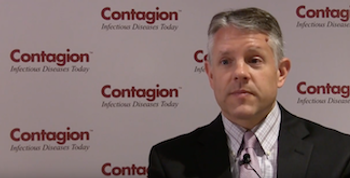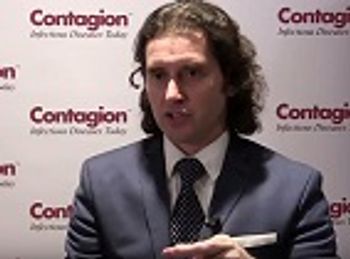
Frank Drews, MS, PhD, professor of cognitive and neural sciences at the University of Utah, Department of Psychology, explains adherence engineering.

Frank Drews, MS, PhD, professor of cognitive and neural sciences at the University of Utah, Department of Psychology, explains adherence engineering.

Matt Linam, MD, MS, medical director of Infection Prevention at Arkansas Children’s Hospital, discusses how visitors can help prevent infection transmission in pediatric healthcare settings.

Thomas Sandora, MD, MPH, hospital epidemiologist at Boston Children’s Hospital, discusses the risk factors for healthcare associated infections in hospital settings that are unique to children.

Grace Lee, MD, MPH, associate medical director, Infection Control, Boston Children’s Hospital, discusses the current VAP bundle and its focus on infectious conditions as well as the need for a VAC bundle that will prevent other causes of VAC for patients on the ventilator.

Thomas Sandora, MD, MPH, hospital epidemiologist at Boston Children’s Hospital, provides recommendations on discussing hand hygiene amongst healthcare providers and between patients and healthcare workers.

Matt Linam, MD, MS, medical director of Infection Prevention at Arkansas Children’s Hospital, discusses the importance of isolation precautions to prevent healthcare associated infections.

Grace Lee, MD, MPH, associate medical director, Infection Control, Boston Children’s Hospital, discusses the importance of optimizing ventilator practices to minimize the risk of VAC in hospital settings.

Jeff Boyd, PhD, assistant professor of Biochemistry and Microbiology at Rutgers School of Environmental and Biological Sciences, discusses how to combat copper and heavy metal resistance.

Thomas Sandora, MD, MPH, hospital epidemiologist at Boston Children’s Hospital, discusses some up and coming pediatric healthcare associated infection prevention strategies.

Grace Lee, MD, MPH, associate medical director, Infection Control, Boston Children’s Hospital, discusses ways to prevent ventilator-associated conditions in hospital settings.

Matt Linam, MD, MS, medical director of Infection Prevention at Arkansas Children’s Hospital, describes the transmission of pathogenic organisms in pediatric hospitals.

Jeff Boyd, PhD, assistant professor of Biochemistry and Microbiology at Rutgers School of Environmental and Biological Sciences, explains the metal-resistance processes of microbes.

Thomas Sandora, MD, MPH, hospital epidemiologist at Boston Children’s Hospital, explains the different ways to prevent bloodstream infections in children and pneumonia for children who are on ventilators in pediatric settings.

Grace Lee, MD, MPH, associate medical director, Infection Control, Boston Children’s Hospital, discusses the different causes of ventilator-associated conditions in adult populations and neonatal intensive care units.

Jeff Boyd, PhD, assistant professor of Biochemistry and Microbiology at Rutgers School of Environmental and Biological Sciences, examines the effectiveness of using copper in healthcare facilities.

Thomas Sandora, MD, MPH, hospital epidemiologist at Boston Children’s Hospital, explains the importance of hand hygiene in healthcare associated infection prevention in pediatric settings.

Jeff Boyd, PhD, assistant professor of Biochemistry and Microbiology at Rutgers School of Environmental and Biological Sciences, explains how copper can be used to prevent a Staphylococcus aureus infection.

Michael Calderwood, MD, MPH, previously assistant hospital epidemiologist and associate director of antimicrobial stewardship at Brigham and Women’s Hospital, outlines ways in which infection prevention strategies can be modified to fit the needs of immunocompromised individuals.

Thomas Sandora, MD, MPH, hospital epidemiologist at Boston Children’s Hospital, lists the most common healthcare associated infections in children.

Jeff Boyd, PhD, assistant professor of Biochemistry and Microbiology at Rutgers School of Environmental and Biological Sciences, examines the virulence factors of Staphylococcus aureus.

Michael Calderwood, MD, MPH, previously assistant hospital epidemiologist and associate director of antimicrobial stewardship at Brigham and Women’s Hospital, discusses some up and coming infection prevention strategies.

Gonzalo Bearman, MD, MPH, hospital epidemiologist, Virginia Commonwealth University, explains the risk of animal to human infection transmission during personal pet, service animal, and assisted-therapy animal healthcare setting visitations.

Gonzalo Bearman, MD, MPH, hospital epidemiologist, Virginia Commonwealth University, describes possible protocols that healthcare institutions can implement in order to reduce the risk of animal to human infection transmission.

Marion A. Kainer, MD, MPH, FRACP, FSHEA, director, Healthcare Associated Infections and Antimicrobial Resistance Program, Tennessee Department of Health, outlines currently available strategies to avoid antimicrobial resistance.

Jason C. Gallagher, PharmD, FCCP, FIDSA, BCPS, President, Society of Infectious Diseases Pharmacists, in light of the recent antibiotic resistant superbug, shares if we will see more cases of antibiotic resistance in the United States.

Gonzalo Bearman, MD, MPH, hospital epidemiologist, Virginia Commonwealth University, discusses the benefits of animals visits to healthcare settings.

Jason C. Gallagher, Pharm.D., FCCP, FIDSA, BCPS, President, Society of Infectious Diseases Pharmacists, in light of the recent antibiotic resistant superbug, tells Contagion what keeps him up at night.

Gonzalo Bearman, MD, MPH, hospital epidemiologist, Virginia Commonwealth University, explains the importance of collaborations between healthcare providers and veterinarians to understand the risks of infection transmission between animals and humans.

Michael Calderwood, MD, MPH, previously assistant hospital epidemiologist and associate director of antimicrobial stewardship at Brigham and Women’s Hospital, explains healthcare associated infection risk factors for individuals who are immunocompromised, and prevention methods.

Jason C. Gallagher, Pharm.D., FCCP, FIDSA, BCPS, President, Society of Infectious Diseases Pharmacists, in light of the recent antibiotic resistant superbug, shares if we are ready for more cases.